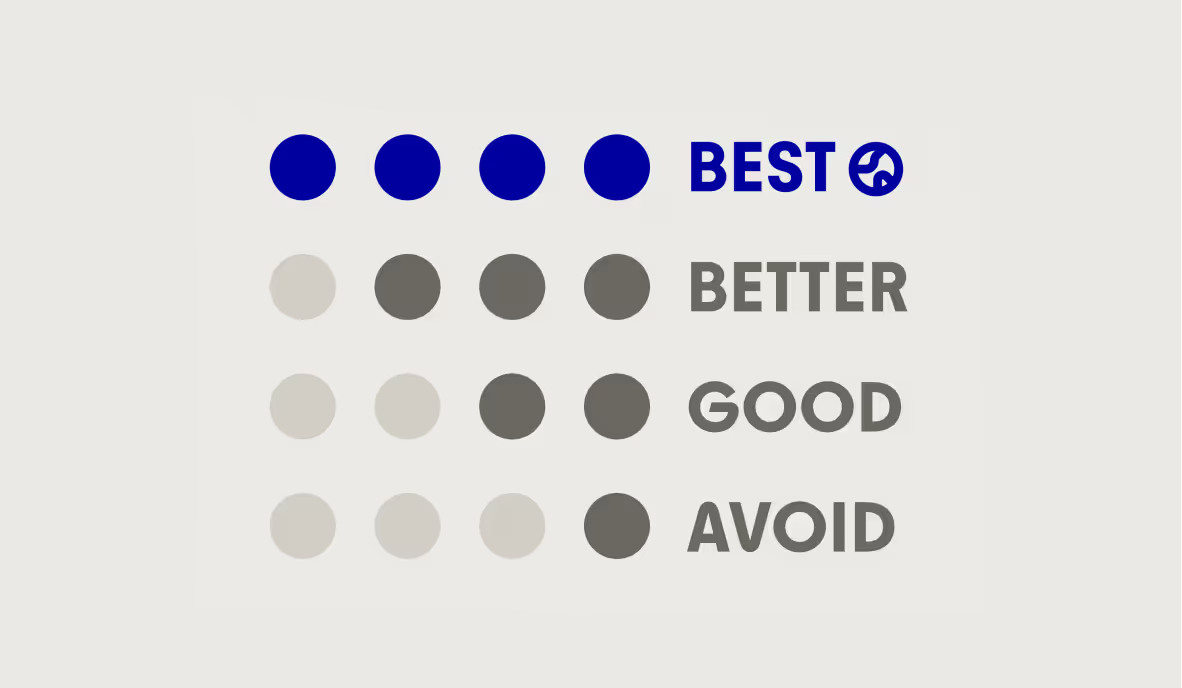How Commons Rates Brands

Join the community





Commons helps people tap into the power of their collective spending choices to lower global emissions. When we evaluate brands as part of our Best Brands series, we’re carefully evaluating the actions they’re taking to meaningfully measure and minimize the carbon emissions associated with their products.
Based on the criteria below, we rank brands Best, Good, Fair, Poor, or Harmful.
- Best: Throughout their supply chains, these brands are taking responsibility for their impact on the people and planet. They're sustainability leaders in their industry, doing more than their fair share.
- Good: These brands are exceeding expectations by actively reducing their carbon footprint and minimizing waste.
- Fair: These brands are meeting the minimum sustainable efforts we'd expect from brands their size.
- Poor: These are medium-to-large brands with fewer sustainability practices than we'd expect at their scale. These may also be small brands that lack public reporting on their sustainability goals or efforts.
- Harmful: These brands are far from meeting the minimum sustainability efforts and reporting that we'd expect from them. Their business and manufacturing practices likely harm ecosystems and employees.
Transparent Supply Chains and Reporting
Openness and transparency encourage trust and build accountability. We look through publicly available information, including sustainability reports, supply chain partner information, certifications, and partnerships. If this information isn’t available, we do not include these brands in our top picks.
We look for brands that measure and share the footprint of their company and/or products. When a company understands what its biggest emissions drivers are, it can make plans to address these drivers while also demonstrating progress against these plans. This involves:
- Measuring their footprint, ideally in collaboration with a third-party partner.
- Reporting their footprint publicly, ideally sharing the breakdown of their carbon drivers.
- Taking ownership of their emissions by compensating their footprint with verified, high-quality offsets.
Meaningful Carbon Reduction Efforts
We look for actions that address the most important drivers of the company’s footprint. For clothing, this includes:
Materials and ingredients
Certifications are important to understand the sustainability of a material and its processing.
For clothing and bedding, a couple of key certifications we look for are:
- Global Organic Textile Standard (GOTS): A processing standard for organic fibers that tracks the entire supply chain with environmental and social criteria.
- Global Recycled Standard (GRS): A voluntary product standard for tracking and verifying the content of recycled materials in a final product. This is especially prevalent for brands using recycled plastic bottles.
For cleaning products, we look out for these labels:
- USDA BioPreferred
- USDA Certified Biobased
- EPA Safer Choice
- Leaping Bunny
- Made Safe
- EWG Verified
- Cradle to Cradle
Energy
We look for brands using renewable energy and/or engaging with their supply chain partners to support decarbonization of their facilities and manufacturing processes.
Slow or Circular Business Models
Commons' top-rated fashion and bedding brand fundamentally shift from fast fashion towards slow fashion and circularity. Evidence of slow or circular business models includes:
- Offering take back and/or recycling programs for their products.
- Recycling or upcycling fabric scraps, rather than letting them go to waste.
- Focusing on timeless pieces and infrequent collection releases instead of pushing trends.
- Engaging in made-to-order or batch manufacturing.
Our top-rated cleaning brands minimize the environmental impact of their products, encourage circularity, and choose more earth-friendly ingredients. They do this with actions like:
- Opting for waterless formulas that require less packaging.
- Offering refill options.
- Choosing organic, bio-based, or upcycled ingredients, free of petrochemical-based ingredients.
Community and Waste Efforts
Although we prioritize carbon-related criteria in our rankings, there are other important factors that determine how a brand treats people and the planet. Some of these include:
- Labor and ethics: Fair Trade certifications and a comprehensive Supplier Code of Conduct (audit for factors like a living wage and safe working conditions)
- Packaging and waste: plastic-free, FSC-certified packaging that is recyclable and recycled
- Other community and environmental efforts: This can include donation programs with nonprofit partners, projects that uplift communities near their supply chain partners, and more.









.jpg)



